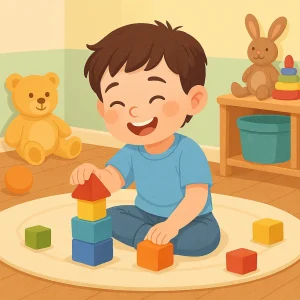How to find the right Autism therapy center for my child?
By Rajini D
Last Updated: May 15, 2023
Autism spectrum disorder is a developmental disability affecting how an individual communicates, behaves, or interacts. Managing the symptoms of Autism is possible with the right therapies according to the child’s needs. These therapies, such as behaviour, speech, occupational, and special education, can make an Autistic individual independent. Therapies are given to support ADLs or activities of daily living. Early intervention helps to manage the symptoms of Autism.

Also Read: Early Identification/ Warning Signs in child development
How to find the right Autism therapy center?
Finding the right Autism therapy center is an important and primary part of planning your child’s therapy sessions. Autism therapy centers work with your child and support the parents and caregivers with resources. It is often heard, “If you meet a person with Autism, you met one person with autism”, which means every individual with Autism is different from the other. In the same way, every Autism Center is different from the others.
Parents with a child on the autism spectrum often plan their routine according to the child’s necessities. Hence the child’s therapy plans and schedules occupy a major prominence in planning your other parts of the day. A transparent approach is needed to discuss and take a call on the sessions. The timings, duration of the sessions, travelling distance to the center, and finances should all be considered before deciding. Everything of this plays a crucial part. Hence, the center that offers flexible therapies helps you make such decisions conveniently.
Know more about The Speech Chain: Understanding How We Communicate
Honesty is important
Being honest and discussing the child’s necessities will help both your child and you. The center should have licensed therapists like RCI (Registered Council of India). You may ask for their registered numbers too. These therapists analyze your child’s case and make a custom-tailored plan for your child. The goals designed by therapists at the therapy center should match your goals. The therapists should actively and openly discuss the therapy plans the child might need and the activities they may try.
Know more about Busting Common Myths About Autism: What You Need to Know
Comparison Table of Therapy Options at Wellness Hub
| Therapy Type | Target Skills | Age Group | Therapy Goals |
|---|---|---|---|
| ABA (Applied Behavior Analysis) | Social skills, communication, behavioral improvements | All ages, most effective for younger children | To improve social interactions, communication, and reduce problematic behaviors |
| Speech Therapy | Speech, language, communication | All ages, tailored according to developmental level | To enhance verbal, non-verbal, and social communication skills. Focus on improving articulation, comprehension, and expressive language |
| Occupational Therapy | Fine motor skills, sensory processing, daily living skills | All ages, customized per individual needs | To promote independence in daily activities, improve sensory integration, and enhance motor skills for better life quality |
| Special Education | Academic skills, cognitive development | Primarily school-aged children | To provide personalized educational support, improve learning outcomes, and assist with academic challenges |
Read more about on What are the therapies offered to Autistic patients? | Therapies of Autism
Know your therapies
You should be aware of the therapies suggested for your child. The meaning and the implemented plans of the therapy should be known clearly. For instance, if you know how ABA therapy helps your child, you are not offered enough information. Be specific in knowing the details.
Planning goals for both the short-term and long-term is important. The short-term goals of therapies are to target the individual’s symptoms that need immediate attention. The experts should discuss the therapy plan’s implementation status periodically with the parent or caregiver. Also, any changes in the plan, if needed, are to be included. The parent should be aware of the therapy plans for the next three months, six months, and for the next year.
Explore more on Engaging Home-Based Occupational Therapy Activities for Children with Autism

Technology and Feedback:
It is a good center if they are equipped with technology to manage the things like following up with the process, consultation feedback, allotment of sessions, therapy plan execution, counting on the number of sessions, the billing process, etc. Suppose everything is being done systematically rather than asking your therapist for every silly thing. In that case, you can understand that they are serious about their job and that you can trust them. The therapist should be concerned about the development and status of the kid and should not bother about the charges or other details. Also, the therapists should be available during the center timings for any feedback or enquiries. They should be able to guide you regarding home-based activities to encourage the child’s progress.
What can I expect from an Autism therapy center?
Being a parent, you should have access to the therapy room if you want to check how the session is going on. The therapy room is usually a simple room containing the necessary instruments. The therapist and the child will be there during the session. For security reasons and to know what is going on, therapy rooms must be equipped with CCTV cameras. The parent should be able to watch the live feed of the therapy session. The CCTV recordings should be stored whenever access to them is requested.
Interaction with the therapist should be provided when the parent makes a request. The therapists should be available and accessible to the parents. Planning finances should be convenient for the caregiver or parent. Flexible payment options help the parents of the middle-income group to manage their financial planning well in advance.
Therapists should set the therapy goals after discussing them with the parents or caregivers. These set of goals should be accessible to parents, both offline and also online, to monitor on their devices and the center’s website. Also, there should be an easily accessible way for parents to provide suggestions and complaints.
Parent Involvement and Support Features at Wellness Hub
| Feature | Description | Benefit |
|---|---|---|
| Access to Therapy Rooms | Parents are allowed to observe therapy sessions directly, ensuring transparency and involvement in the therapy process. | Enhances trust and allows parents to see real-time progress, reinforcing techniques at home. |
| Regular Updates & Reports | Therapists provide frequent updates and detailed reports on the child’s progress, including milestones and areas of improvement. | Keeps parents informed and engaged in their child’s development, ensuring a collaborative approach. |
| Online Portal Access | A secure online portal where parents can view session schedules, therapy notes, and progress reports. | Offers convenient access to important information, enabling parents to stay connected and informed. |
| Feedback Mechanism | A structured system for parents to provide feedback on therapy sessions and any concerns they might have. | Ensures the therapy remains responsive to the child’s needs, allowing for adjustments as necessary. |
| Flexible Scheduling | The ability to schedule therapy sessions at times that work best for the family’s routine. | Reduces stress on families by accommodating their schedules, making therapy more accessible. |
| Financial Planning Assistance | Guidance and support in understanding and accessing available financial options for therapy. | Helps families manage the cost of therapy, making it more accessible to those in need. |
Also Read: Understanding & Parenting an Autistic Child: Guide & Tips
How the centers should not be:
When a center offers something, no unrealistic statements should be made. If the promises of a therapy center sound too good to be true, then it’s a red flag. Suppose a therapy center makes false promises or claims to have a “cure” for Autism, then stay away from them. Because there is no cure for Autism, the symptoms of Autism can only be managed.
Experts recommend Early intervention services for individuals with Autism. It is so because the early the symptoms are addressed, the better the results will be. Similarly, the therapy plans of these services according to their symptoms are planned for each individual separately. Hence, beware if the center follows a standard procedure of suggesting all the available therapies for all the children there. In the end, this is all about managing the symptoms of Autism for each child.

The kind of therapies, individual or group, should also be informed to the parent or caretaker before allotting the sessions. Experts advise group sessions to improve the child’s social skills. The experts at the center should clearly explain the need for those sessions to you. If not, something about the place could be fishy. It’s good to check because transparency is a must.
Conclusion
Choosing the right Autism therapy center for your child is a nuanced decision that requires careful consideration of the center’s approach, the qualifications of its therapists, and the flexibility of its therapy sessions to ensure they meet your child’s unique needs.
We at Wellness Hub offer a multidisciplinary approach to addressing your child’s needs according to the individual’s requirements. Our approach includes the expertise of subject-matter experts, enabled by technology and supported by physical products. Book a free consultation today to know what else you can do to support individuals with Autism.
Frequently Asked Questions:
1. What is Autism Spectrum Disorder (ASD)?
Autism Spectrum Disorder (ASD) is a developmental disability that affects communication, behavior, and social interactions. Each individual with ASD has a unique set of strengths and challenges, requiring personalized therapy and support.
2. Why is early intervention important for Autism?
Early intervention is crucial for individuals with Autism as it addresses symptoms and challenges at a young age, leading to better long-term outcomes. It involves tailored therapies to enhance development and independence.
3. What therapies does Wellness Hub offer for children with Autism?
Wellness Hub offers a range of therapies tailored to each child’s needs, including behavior, speech, occupational, and special education therapies. Our multidisciplinary approach ensures comprehensive support for children with Autism.
4. How does Wellness Hub customize therapy plans for children with Autism?
At Wellness Hub, therapy plans are customized based on a detailed assessment of each child’s unique needs and goals. Our licensed therapists use this information to create personalized therapy sessions that target specific areas of development.
5. Can parents be involved in their child’s therapy sessions at Wellness Hub?
Yes, Wellness Hub encourages parental involvement in therapy sessions. Parents can have access to therapy rooms and are provided with regular updates and feedback, ensuring they are an integral part of their child’s progress.
6. What makes Wellness Hub different from other Autism therapy centers?
Wellness Hub stands out due to its commitment to personalized care, integration of technology for effective therapy management, and a focus on early intervention. Our flexible scheduling and payment options also cater to the needs of diverse families.
7. How can I book a consultation with Wellness Hub for my child with Autism?
Booking a free consultation with Wellness Hub is easy. Visit our website and fill out the contact form or call us directly to schedule an appointment. Our team is ready to support you and your child with tailored autism therapy solutions.
8. What role does technology play in Autism therapy at Wellness Hub?
At Wellness Hub, technology plays a critical role in enhancing the effectiveness of Autism therapies. We use advanced software and tools for therapy planning, progress tracking, and communication, ensuring a seamless experience for children and their families.
9. How does Wellness Hub support the development of social skills in children with Autism?
Wellness Hub supports social skill development through individualized and group therapy sessions designed to improve communication and interaction. Our therapists use evidence-based strategies to encourage positive social behaviors and peer engagement.
10. How can parents track their child’s progress in Autism therapy at Wellness Hub?
Parents can track their child’s progress at Wellness Hub through regular updates and detailed reports from therapists. We also provide access to a secure online portal where parents can view session notes, therapy goals, and progress charts, ensuring transparency and involvement in their child’s development journey.
About the Author:
Rajini Darugupally
M.Sc., Speech-Language Pathologist (9+ years of experience)
Rajini is a passionate and dedicated Speech-Language Pathologist with over 9+ years of experience, specializing in both developmental speech and language disorders in children and rehabilitation in adults. Driven by a desire to empower each individual to find their voice, Rajini brings a wealth of experience and a warm, genuine approach to therapy.
Currently, at Wellness Hub, she thrives in a team environment that values innovation, compassion, and achieving results for their clients.
Connect with Rajini to learn more about how she can help you or your loved one find their voice.
Book your Free Consultation Today
Parent/Caregiver Info:
Client’s Details:
* Error Message








